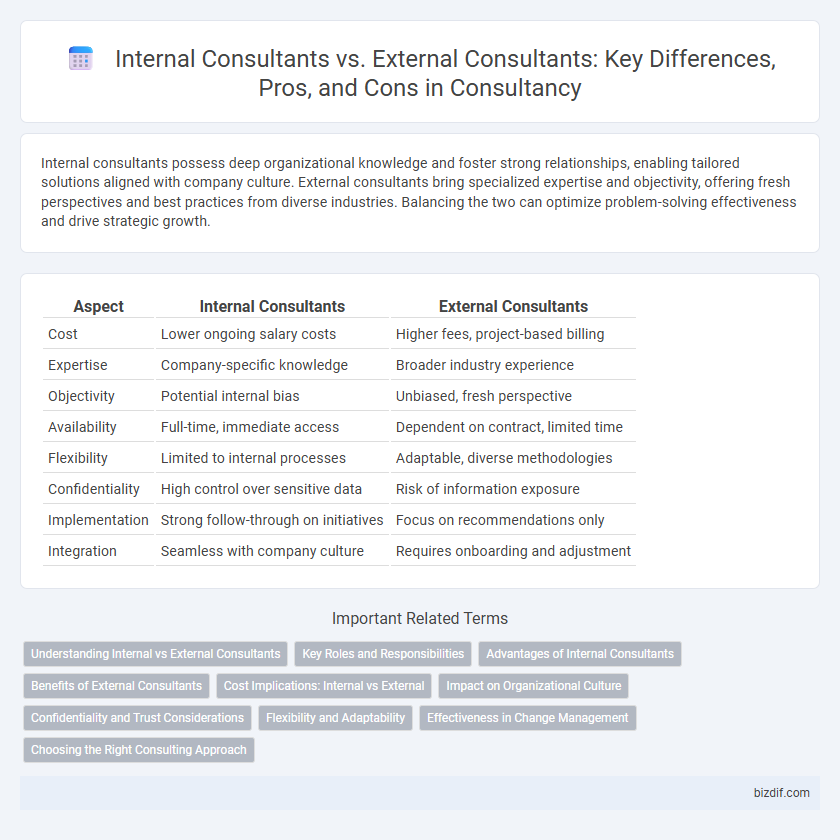Internal consultants possess deep organizational knowledge and foster strong relationships, enabling tailored solutions aligned with company culture. External consultants bring specialized expertise and objectivity, offering fresh perspectives and best practices from diverse industries. Balancing the two can optimize problem-solving effectiveness and drive strategic growth.
Table of Comparison
| Aspect | Internal Consultants | External Consultants |
|---|---|---|
| Cost | Lower ongoing salary costs | Higher fees, project-based billing |
| Expertise | Company-specific knowledge | Broader industry experience |
| Objectivity | Potential internal bias | Unbiased, fresh perspective |
| Availability | Full-time, immediate access | Dependent on contract, limited time |
| Flexibility | Limited to internal processes | Adaptable, diverse methodologies |
| Confidentiality | High control over sensitive data | Risk of information exposure |
| Implementation | Strong follow-through on initiatives | Focus on recommendations only |
| Integration | Seamless with company culture | Requires onboarding and adjustment |
Understanding Internal vs External Consultants
Internal consultants possess in-depth organizational knowledge and strong alignment with company culture, enabling tailored solutions and faster implementation. External consultants offer specialized expertise and unbiased perspectives, bringing industry best practices and innovation across different sectors. Choosing between internal and external consultants depends on factors like project scope, confidentiality concerns, and resource availability.
Key Roles and Responsibilities
Internal consultants leverage in-depth organizational knowledge to facilitate change management, process improvement, and strategic development within their company, ensuring alignment with corporate culture and goals. External consultants bring specialized expertise and objective insights, conducting independent assessments, delivering best practice recommendations, and supporting project implementation across diverse industries. Both roles emphasize stakeholder engagement, problem-solving, and value-driven results, but internal consultants focus on long-term internal capacity building, while external consultants offer flexible, short-term interventions.
Advantages of Internal Consultants
Internal consultants bring a deep understanding of organizational culture and processes, facilitating faster problem-solving and tailored solutions. Their constant presence ensures seamless communication and stronger alignment with company goals, enhancing overall project effectiveness. Cost efficiency is another advantage, as internal consultants reduce expenses related to onboarding and external fees.
Benefits of External Consultants
External consultants offer specialized expertise and an unbiased perspective, enabling organizations to address complex challenges with innovative solutions. Their flexibility allows companies to scale consulting services based on project demands without the costs of full-time employment. Access to diverse industry experiences and best practices improves decision-making and accelerates project delivery.
Cost Implications: Internal vs External
Internal consultants often incur lower direct costs as they are salaried employees with existing access to company resources, minimizing expenses for travel and onboarding. External consultants typically charge higher fees due to specialized expertise and project-based engagements, which can include additional costs such as travel, accommodations, and premium rates. Organizations must weigh the predictable salary expenses of internal consultants against the potentially higher but flexible spending on external experts for short-term, high-impact projects.
Impact on Organizational Culture
Internal consultants foster deeper understanding of organizational culture through ongoing collaboration and insider knowledge, enabling tailored change initiatives that resonate with employees. External consultants offer fresh perspectives and specialized expertise, often catalyzing innovation but may face challenges in aligning with existing cultural norms. The balance between leveraging internal insight and external objectivity significantly influences the effectiveness of cultural transformation efforts.
Confidentiality and Trust Considerations
Internal consultants benefit from a deep understanding of company culture and established trust, facilitating easier access to sensitive information while maintaining confidentiality within organizational protocols. External consultants often bring unbiased perspectives but require strict confidentiality agreements and trust-building measures to safeguard proprietary data. Ensuring clear communication and confidentiality standards is critical to maximizing the effectiveness of both internal and external consultancy roles.
Flexibility and Adaptability
Internal consultants demonstrate high flexibility in navigating organizational culture and internal processes, enabling tailored solutions aligned with company-specific goals. External consultants bring adaptability through diverse industry experiences and innovative methodologies, allowing them to address complex challenges with fresh perspectives. Both types leverage flexibility and adaptability to optimize problem-solving, though internal consultants excel in intimate organizational knowledge while external consultants offer broader market insights.
Effectiveness in Change Management
Internal consultants leverage deep organizational knowledge and established relationships to drive tailored change management strategies, resulting in quicker adaptation and higher stakeholder acceptance. External consultants provide specialized expertise and unbiased perspectives, enabling innovative approaches and addressing complex change challenges with fresh insights. Combining internal familiarity with external objectivity often delivers the most effective outcomes in change management initiatives.
Choosing the Right Consulting Approach
Internal consultants offer deep organizational knowledge and immediate access to company resources, enabling tailored solutions aligned with corporate culture. External consultants bring specialized expertise and objectivity, often providing innovative perspectives and benchmarking against industry standards. Choosing the right consulting approach depends on project complexity, desired impartiality, and the need for specialized skills or cost-efficiency.
Internal Consultants vs External Consultants Infographic

 bizdif.com
bizdif.com